#endos vs. did
Text
What the traumagen vs endogen fight on here reminds me of (the traumagen is the hydrogen bomb lmao)
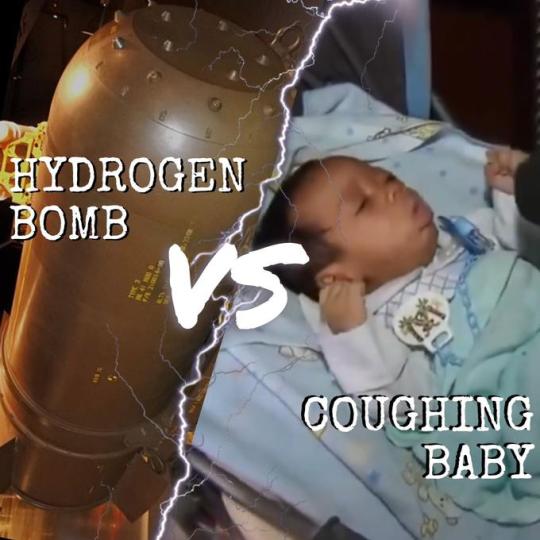
NO I DO NOT MEAN WE ARE ACTUALLY KILLING PEOPLE, I WISH DEATH ON NO ONE. WE ARE SIMPLY FIGHTING THEM OFF THE PLATFORM LMAOOOOO
#pluralgang#endos fuck off#actually plural#anti endo#did system#fuck endos#redcherryrain#hydrogen bomb vs coughing baby
48 notes
·
View notes
Text
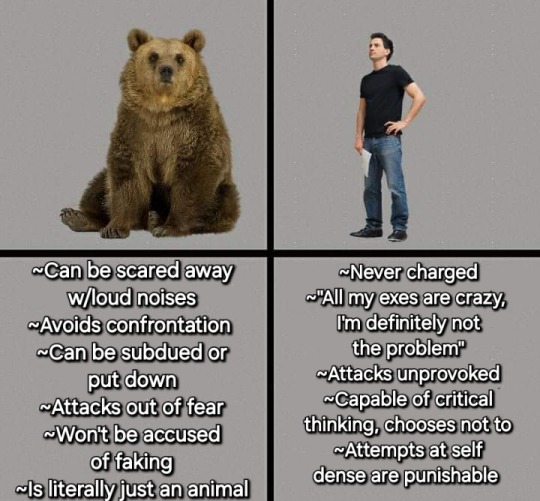
Just saying
~Avery: 14, cardinal/middle, they/she
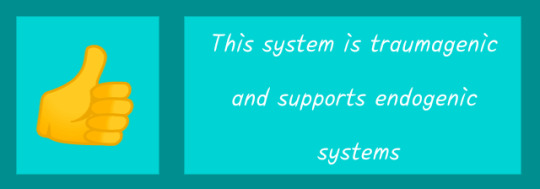

#did system#nonbinary#pro endo#actually did#endogenic safe#meme#actually plural#plural community#plural system#plural#plural stuff#plurality#bear vs man#dank memes#funny memes#best memes
8 notes
·
View notes
Text
"Are we really plural if--" Yes. This is a non-exhaustive flowchart with a small sampling of origin labels, system experiences, and how being disordered can (or doesn't) fit in.
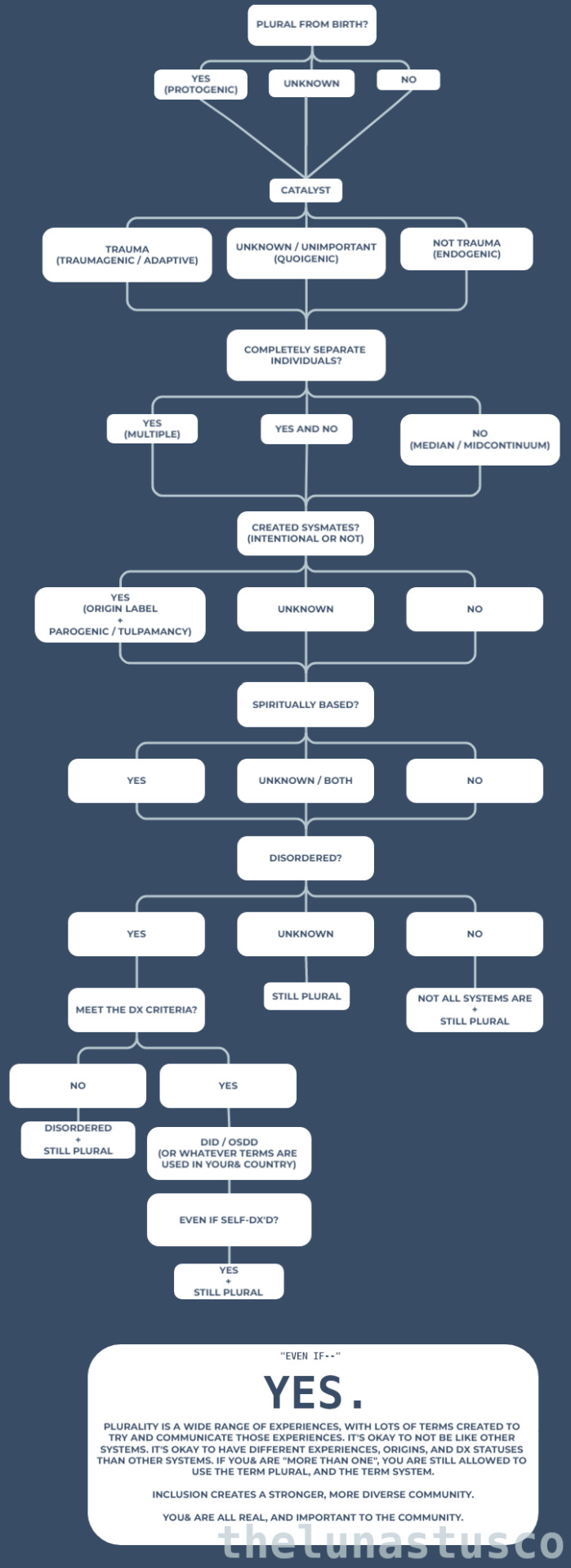
These questions share a lot of overlap, but they are still separate issues. (Note: not all wDID/OSDD/etc identify as plural or as systems. This chart is purely for folks who are plural/systems.) A huge problem these days are some people, including systems, conflating it all.
We didn't include topics such as age of onset, overtness, or types of system members. To us, that is covered by the blurb at the end: YES. If you& are "more than one", that is plurality. And you& can use the term "system". Everything else is details.
The community needs to go back to embracing the concept of "more than one" being the only requirement for being plural/a system. Microlabels can be important for articulating experiences, but they don't make or break what plurality IS. Cheers.
PS: When we say “disordered” outside of like, a dx’d disorder, we mean knowing that your system has struggles that impact it but might not be severe enough for a dx. Or that don’t really impact functioning.
#plurality#plural systems#actuallyplural#actuallymultiple#endo positive#sysmeds fuck off#we just really want system to stop equating ORIGIN and DIAGNOSIS and SPIRITUAL VS PSYCHOLOGICAL#as if trauma formed and DID and psychological are all the same thing#they're not#endo safe#you can be endogenic and have DID and be purely psychological#you can be trauma formed and not have a disorder and be spiritually based
94 notes
·
View notes
Text
I'm starting a go fund me to buy X (formerly Twitter) so that we can send all these new people back where they came from
Please send me money to my inbox
#syscourse#pro endo#osdd#did#anti endo#syscourse stop please#it's incompatible#the Twitter syscoursers and tumblr syscoursers grew up in different time lines#someone do a syscourse catchup post so these newbies can stop rehashing old points#this goes for both sides#i want a tumblr vs Twitter syscourse post#explaining what each group already agrees on
14 notes
·
View notes
Text

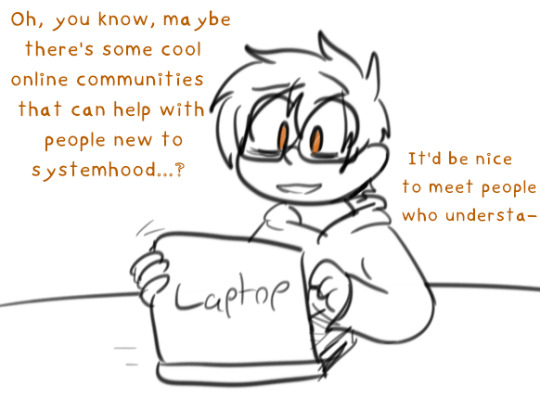

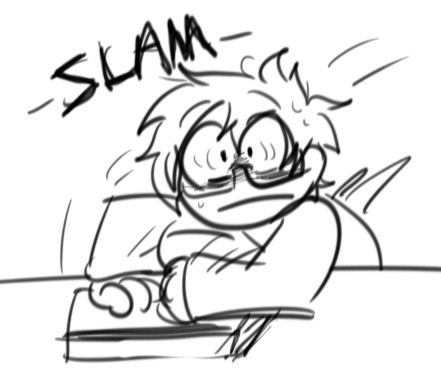

So I've discovered this "syscourse" people are talking about...
#REMIND ME TO NEVER GO THROUGH THE OSDDID TAG AGAIN OMG#my art#doodles#j.txt#I HAVE LEARNED A LOT OF TERMS TODAY THAT I DID NOT NEED TO LEARN.#'endos dni!' 'sysmeds dni!' '[50 other things] dni!' BRO I JUST GOT HERE#NOT TO MENTION THE HORROR STORIES OF FAKECLAIMING AND HARRASSMENT? OHHH BOY#THIS IS. PROBABLY NOT A GOOD ENVIRONMENT FOR SOMEONE TRYING TO STILL FIGURE THINGS OUT IS IT.#syscourse tw#I GUESS????????#welp color me far too scared to try and find any online communities now LOL#except not lol jesus christ i didnt think 2023 tumblr was capable of being so hostile but here we are#vent#I THOUGHT THE WILLIAM AFTON STANS VS ANTIS CIRCA 2019 WAS BAD. OH BOY WAS I WRONG.
49 notes
·
View notes
Text
Half our alters speach
"You were talkin funny before." "Oi don't say shit ya don't mean, feckin rude much."
Vs
"Ah, yes I'm quite alright. I hope you have a wonderful day." "It's rather insidious the way those nurses acted."
LIKE GUYS
It's funny seeing how people react to switches between the two tho
-Lore
#Harley vs ingo lol#theres way more veriation but these are the most distinct#did system#did osdd#dissociative identity disorder#dissociative system#anti endo
12 notes
·
View notes
Text
Was not expecting such a major cliffhanger at the end of today's chapter!
What's interesting is that Twilight could have shot Yuri but he hesitates (note the "waver" sfx in the panel where he's holding his gun).

Another subtlety is that Twilight is the one lowering his gun on the next page.

And there was also only one "bang" in the next panel.

Then we get the scene with Yor, obviously foreshadowing this bad turn of events.
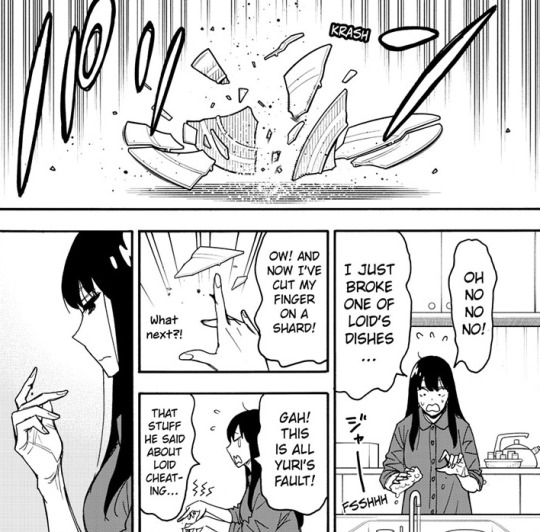
She seems to have forgiven Loid and is only upset with Yuri for suspecting him of cheating...obviously because she was never truly angry at him to begin with and only invented those "gripes" to seem normal.
The blood dripping in the final panel of the chapter is not from Yor's cut but from the previous scene of Twilight vs Yuri (it's a bit confusing since it immediately follows the panel of her looking at her cut, but you can see the pebbles on the ground, so it's not in the kitchen).
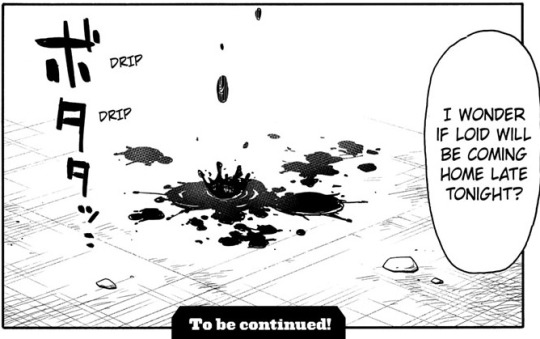
My guess is that Twilight is the one who got shot, for the reasons I pointed out before of him seeming to hesitate about shooting Yuri. It makes sense since he knows that Yor would be devastated if anything happened to him. And maybe, deep down, he's grown slightly fond of his wacky brother-in-law. On the other hand, Yuri doesn't know that Loid is Twilight...but if he did, would he hesitate too, for the same reason? Regardless, I doubt the wound will be fatal, but it looks bad enough to be something that Loid (or Yuri) won't be able to hide from Yor or anyone else. Some people are speculating that Twilight and Yuri will meet up back at the Forger house, and Loid will have to somehow hide his injury to keep Yuri from being suspicious. But we'll see! I don't want to theorize too deeply since the arc is still ongoing and anything could happen. Heck, someone else could have gotten involved off-panel and will turn out to be the one who actually got shot. So many possibilities!
But gosh, this arc is turning out to be exciting! I wasn't sure at first, but now I think there's a chance we will indeed get something major from it, like an identity reveal for Yuri and Twilight. Or Twilight could manage to get away without Yuri finding out that he's Loid. But we haven't even seen the real Wheeler yet, and I feel like the arc wouldn't end without him showing up, and probably interacting with Twilight.
Gah, this is really shaping up to be a long and possibly plot-altering arc! The two-week wait for the next chapter will be torture! But at least (per this latest illustration from Endo), Anya is having a nice time at the zoo.

I can already envision her shocked expressions when she reads Mama's, Papa's, and Uncle's minds later.
#spy x family#spy family#sxf#spyxfamily#loid forger#yor forger#sxf manga#sxf manga spoilers#sxf spoilers#yuri briar
850 notes
·
View notes
Text
Oh boy, lets open that can of worms
There's a LOT of discourse with endo vs anti-endo stuff (endogenic system=plural system not formed by trauma if you don't know 🙂). Like, death threats coming from both sides kinda thing. We try to stay out of it. But it's easy to accidentally stumble into it if you're not familiar with some of the nuance. So we want to share some observations as like, a crash course. (And apparently we had a lot to say lol.)
This post isn't really to debate how plurality forms. Just to give some context as to why so much hate is flying between these two groups.
Basically, you have 2 extremes. (And everyone in between obviously)
On one side you have people making up extra rules on top of the diagnostic criteria to exclude and gatekeep anyone who doesn't meet "their level" of disordered. (I've literally heard people say "you can't be a system, you're not as traumatized as me"). A lot of accusations of faking come from this bunch. Too much internal communication? Faker. Too many non-human alters? Faker. Too many or not enough alters? Faker. You can't win with them even if you have a diagnosis.
We've noticed a lot of parallels between this group and transmeds. You need to have x level of dysphoria to ride this ride. You can't be trans if you don't want xyz treatment. You need to reach my arbitrary bar of "trans enough". Enbys and everyone else are fakers. That kind of bs.
But on this side you also have a lot of people who just want to be taken seriously. They want to be validated by their diagnosis and feel hurt when people say or do things that they think will compromise that validity. They, at least initially, come from a place of sincerity not malice. But they fall into the trap of trying to be "one of the good ones".
On the other extreme you have the wild west. Things people treat as fact aren't codified with the same scrutiny as the DSM-5 or ICD-11. This breeds its own confusion and misinformation. We've seen people conflate plurality with things like maladaptive day dreaming, lucid dreaming, adhd, and (applying it to other people with ferocity to the point of harassment) metaphors of all things.
They have a spaghetti at the wall approach that reminds me of a less extreme MOGII (an attempt to define just about every possible form of gender and sexuality). It's a messy patchwork of ideas. We've seen 8 different labels that all mean the same thing and are being used by exactly no one. Redundancy and hyperspcificity, that's the name of the game. But frankly we like this if for no other reason than we want to see what sticks, what becomes mainstream.
We've seen people from this group attack people as badly as the anti-endo group. Openly mocking people for having trauma or saying vile shit like "traumagenics kys". They feel threatened by the exclusionary nature of diagnoses. But instead of taking their frustration out on the systems of power they take them out on normal people. After all if you're diagnosed, you "represent the system"... I guess. Equally bull shit.
But this is also where the edge cases go, the exclusions, those that don't fit into a neat little box. The DSM excludes people whose plurality is accepted as part of their culture or religion. These people don't suddenly stop being systems just because they're accepted, but they're distinctly not disordered. They don't meet the clinical definition of DID or OSDD. Same goes for someone whose symptoms are mild enough to not cause "clinically significant distress". You also have people who don't want to be pathologized or have been failed by the medical system.
So lastly, a warning: When dealing with plural stuff, it's very easy to go stumbling into a mine field.
Tldr: I would always rather land on the side of letting too many people in than exclude people who needed the support. However, no matter your in-group, some people take things too far. Like, ffs don't attack people.
-Taylor & Mark
#not giving this any proper tags cause I don't want a fucking maelstrom of hate coming at us lol#long post#this might be a bad idea
170 notes
·
View notes
Text
About Loid Forger's therapy in SxF manga chapter 77
(Spoilers ahead)
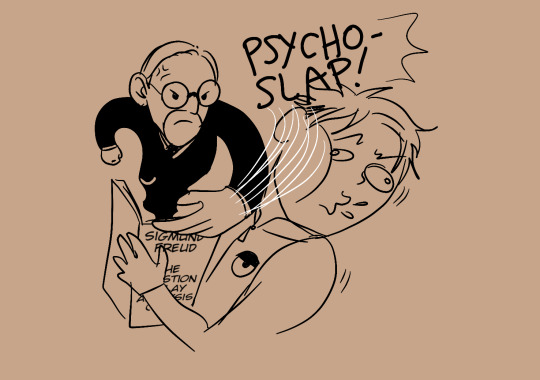
There's a Freudian text for everything. Today's all about The Question of Lay Analysis (1926), also known as Wild Analysis.
Endo did what I have been planning to do for a comic of my own: depict Loid actually working as a Psychiatrist. While I'm glad he took this path, sadly I can't say he did a good job on it.
As some of you know, I'm a therapist grounded in Psychoanalitic Theory. Yes, I like Freud and Lacan, and no, Oedipus Complex is not what you heard it is. I did a brief analysis of Psychiatry stuff in SxF in the past, and today I feel compelled to repeat that exercise.
Let's go in order.
1. The importance of being a third party

What's the reason for which people ask a therapist for help, and not their families or friends? What do we have that they don't?
The answer is pretty simple: neutrality. We don't have a side other than rationality and ethics. A good therapist should be able to listen to his patient without losing objectivity.
When you and your patient have a shared, unique shared experience, it's preferable, even ethical, to refer him to another therapist, in order to preserve the higher interest of the patient. The more neutrality you can muster, the better for the curing process. Otherwise, it's really hard to listen to someone else without being constantly reminded of yourself. It turns into a blind spot.
Now, there are exceptions to this rule, but you must handle them carefully, and always putting the patient at the center. Loid openly talking here about how close he is to the hijacking incident doesn't help much.
In short, you have to ensure that your position in the therapeutic process remains an impartial, neutral Other, and avoid becoming a fellow. It's good to create trust, but not too much, just enough to work.
2. Chronic condition (?)
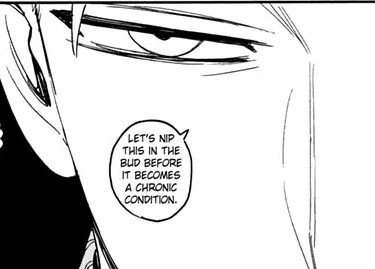
The biggest difference between a Psychiatrist and a Psychologist is that the first went to Med School. Hence, chronicity is a term that applies mostly for organic conditions, but it's rare in the field of subjectivity.
In my short experience, I've met cases labeled as "chronic depression" being cured. I, myself, cured a case of "compulsive suicide attempts since 15 years old, chronic depression, started hearing evil voices 2 weeks ago". You might think that I'm a great therapist, but it's not the case; it's just that, in order to tackle subjective problems, you ought to go to the root of the symptoms and deal with the subjectivity you find there. Psychoanalitic therapy has proven to be wonderful to treat many conditions that didn't get a cure in other types of psychotherapy.
Of course, it's not a panacea. There are things that we can't figure out yet. But bear in mind that chronicity, in the field of the mind, is more complex than just the passage of time and only a bunch of mental conditions truly admit it.
Jacques Lacan, the most important psychoanalist after Freud, said that the unconscious's track of time is not chronological, but logical. You don't just jump out of adolescence because you turned 18; other things need to happen for you to finally feel like an adult. It's a logical progression. The same can be said about some "chronic" conditions.
3. Explicit Reason of Consultation vs Latent Reason of Consultation
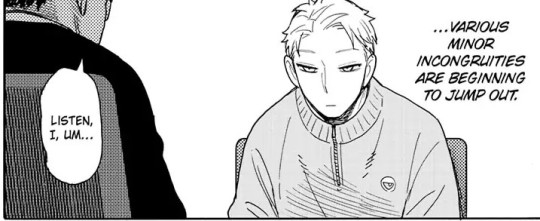
A.K.A Everybody lies.
Psychotherapy is a really weird thing to learn and master. In Psychology School they teach you that you must trust what your patient tells you, but at the same time, distrust him enough. How to conceal both things?
Well, everything is easier when you take Dr. House's words to heart.
Everyone states a reason for consultation, but that first reason is never the real reason, no matter how reasonable it might sound. The trick to discern what the latent, real reason for consultation is, is to determine what the subjective conflict hiding in plain sight is. Sometimes there isn't any and therefore, a full psychotherapy is not necessary (maybe just assisting someone with some things, being there just in case, etc), but most cases are built upon a conflict.
I'm glad that Loid here decided to act like a good Psychiatrist and took a mental note on the oddities.
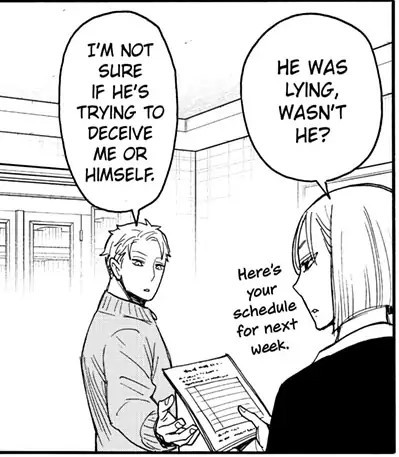
WELL SAID MY BOY, I'M PROUD OF YOU
I want to remark this, because it's discouraging how many therapists oversee this to simplify their job to an extreme. Believe it or not, there are therapists out there that act upon what their patients tell them first. "Hi doc. I came here today because I got an accident and I think I have PTSD". "Ok, I'll have you practice these mindfulness excercises and you should be ok within a month, see ya". DUDE.
4. The place of truth in the context of Psychotherapy
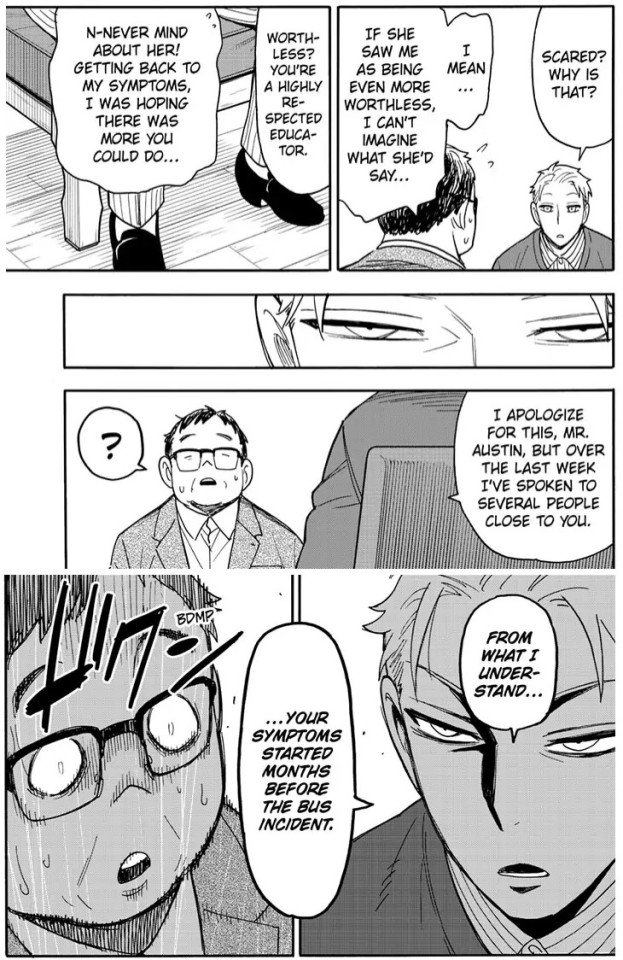
Ah, the classic temptation of knowing the 'real' truth. Is this patient in front of me bullshitting his way out? Is he in a delirium? Is she telling the truth, or just embellishing her story to make it more believable?
You don't have this struggle once you are certain of your role as a psychotherapist. And your role is to help your patients to deal with their subjective struggles.
In short: Psychoterapy deals with the patient's truth, not with the 'real' truth.
You know who deals with 'real' truth in the field of Mental Health? Social Workers.
We psychotherapists don't need to ascertain our patient's claims. Confronting them with reality usually proves to be fruitless, just like Loid did here ("But you're a respected educator!"). It's way more useful to open the topic by asking more questions such as "How did you reach that conclussion?" "What made you think that way?", or giving a specular answer ("You speak like someone else said that about you", "You're too hard with yourself. Where does that come from?", "It sounds like you're belittling your fear for what your wife could say", etc etc etc).
Whenever you're with a neurotic patient, their own personal truth is the only truth you need to work with. Leave the 'real' truth for people who actually needs it, like Social Workers, Doctors or Judges. Your role with a patient is to make sure that his personal truth can turn into something less painful. No need to talk with their friends and family for info, unless your patient is a child or a teenager; just ask him and stick to what he says word by word.
There's a huge topic about the place of reality in therapy, specially in the field of Psychoanalysis, but if I start this train of thought I'm afraid I'll go down to Hell. If you're interested, I've reblogged some Lacanian pills on this Tumblr, check them out by searching the tag #lacan.
PS: NO LOID, DON'T DO THAT. DON'T BREAK THE TRUST YOU ACHIEVED WITH MR AUSTIN! CONFIDENTIALITY IS A MUST!!
5. Counceling = Psychotherapy?

Loid is a (fake) Psychiatrist, not a psychotherapist, so I can't be too hard on him. Also I stan this man. I'm painfully well aware that councelling and coaching is an alternative to psychotherapy in other parts of the world, mostly in the US. But let's not forget one thing:
Psychotherapists DON'T GIVE ADVICES.
At least, not the ones that take this job seriously.
Everyone can give advices. Do you want an advice? Ask your family or friends, or post something in social media, or ask a complete stranger in the street what to do. You'll get plenty of answers and advices. Maybe a bunch of them will be really useful. Good!
The thing with advices is that:
-They act like a universal recipe for a problem
-There's no universal recipe to sort a problem
-They don't tackle the subjective root of a problem
-They assume that the problem can be solved by something you can do upon your surroundings, when the real struggle stems from subjective problems
Some advices do help with real struggles, but when you have a subjective conflict, they barely help; hell, sometimes they make everything worse.
Like Loid here.
Remember when I mentioned that the unconscious mind's track of time is not chronological, but logical? This is a great example. Mr Austin won't be able to properly talk with his wife just because Loid adviced him to; he must solve other issues before that.
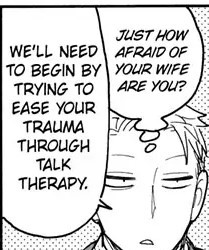
I'm glad we're on the same page on this one
6. Your therapist is not your friend
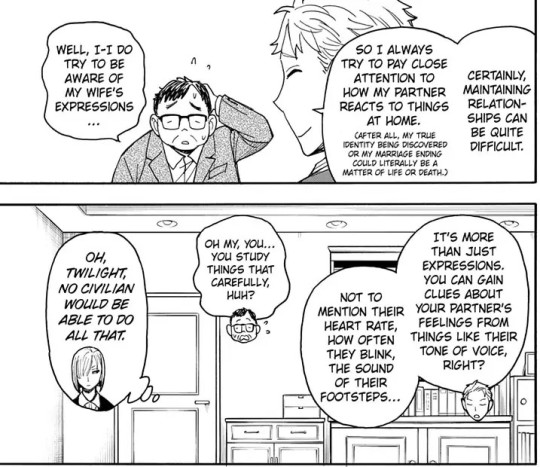
Sad but true.
If your therapist is good enough, you won't know many things about his private life. You won't know about his lover, his hobbies, where does he live, what does he fear.
Why the secretism? Because it's useless for the patient. Also because disclosing personal information has the effect of becoming a model for the patient, who would start to imitate you. And finally, because you need to mantain a semblance of neutrality and not getting emotionally close with the patient more than necessary.
PS: It's kinda cute how aware Loid is about Yor's every movement. Kinda. KISS HER ALREADY, GODDAMNIT
7. Talking cure and (how not to use) the divan
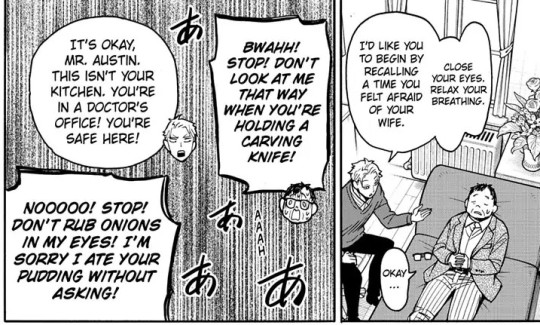
I talked a bit about divans here.
There, I mentioned that you should NEVER PUT A PSYCHOTIC PATIENT IN A DIVAN. NOPENOPENOPENOPENOPENOPE. Well, we can amplify this rule a bit and say that you should avoid the divan with any patient that has a risk of getting seriously upset, like in severe trauma.
The divan is not the only thing that could play against you if badly used. There are cases in Psychiatric Hospitals of patients getting upset because their therapists used the same clothes and hairstyle every single day for months. The point here is that, with psychotic patients and fragile psychic structures (like what happens in traumatized people), you can't use methods that require too much projection.
Also, Lottie here is not performing a Talking Cure.
The divan has been used since Freud to facilitate transference through the Free Association Method. You lay down on it and your therapist ask for whatever crosses your mind first. You don't put a content there beforehand.
(On the same line, if you're a therapist, please refrain from decorating your consultation room with motivational phrases. You're putting words in your patient's mouth before he even starts to speak)
So, it's useless to make Mr Austin lay down on a divan, only to ask him to remember a specific memory. I'd advice (Ha! The irony!) against using the divan here.
----------------------------------------------------------------------------
To finish my Two Cents, I'd like to point some positive aspects of this chapter.
It's nice that a troubled person decides to seek for help. There's still a huge stigma about men requiring mental health help, and it's a nice example to settle to portray one actually going to a Psychiatrist. Men usually struggle with their problems alone and they have it rough.
It's also nice that, in the end, Loid could help his patient. I wonder how (How?!), but it probably means that, at some point of the process, he changed his methods for the better.
And yes. Sometimes, helping one single person can change many lives. I'm honored to be able to attest to that :D
As everyone, I'd expect the logical sucession of events that could follow this chapter: Loid realizing he's got a heck of a wife compared to other marriages, appreciating Yor more, and giving us heavy smut cute TwiYor moments. But Endo has proven to be an author that doesn't like to follow logic. So, let's brace for whatever will come in two weeks.
Thank you for reading!
#spy x family#loid forger#psychiatry#psychoanalysis#sigmund freud#jacques lacan#psychotherapy#spy x family manga#sxf
393 notes
·
View notes
Text
For anti-endos who think it's just mislead endos creating misinformation within the community, let me copy/paste a few juicy tidbits from a 50+yo DID System who's been rejecting treatment for over three decades that I just furiously argued with:
"I think fusion is another form of singlism. It's prejudice against multiplicities."
"You're making a case for a choice you wouldn't even choose. I don't get it. It's like stabbing yourself without knowing you are doing that." (Because I was arguing that every System should make that choice for themselves)
"I experience it as prejudice. I'm not demonizing anyone except the people who suggest it, who are always singletons"
"That's why I think the idea of final fusion is a myth that is pushed by singletons who are not aware of how prejudiced they are against multiplicities. Worse, it's a prejudice many multiplicities have internalized."
"That's like advocating for that Christian practice for changing gay people into straight people. It doesn't work. It's not humane." (Yes he really did compare final fusion to conversion camps)
And finally, my personal favourite: "DID is not a disorder."
Pro vs anti in regards to endogenic Systems is not productive. It won't accomplish anything. The misinformation is COMING FROM BOTH SIDES.
We need to start ignoring origin as a topic to be exhaustedly argued about in a purely circular manner and start combating the misinformation on both fronts because it doesn't matter what origin someone has when it comes to validity or existence. What matters is the misinformation being spread by BOTH sides.
45 notes
·
View notes
Text
Honestly, it's talked about a lot just how rigidly medical many anti-endo spaces are, but I don't think it's talked about nearly enough how pro-endo spaces often fall into the exact same rhetoric. In fact, I have seen many pro-endos who push for even more strict medicalization than anti-endos do with regards to CDDs.
I cannot count the amount of times I have seen a pro-endo system say "I cannot have DID because I did not experience this specific type of severe abuse" or "I cannot have DID because my trauma didn't happen before the age of 9" or "I cannot have DID because I can still function fairly well in my daily life".
By making statements about what kind of trauma needs to happen, or quoting rigid age ranges for DID, or drawing lines in the sand at how disabled you need to be in order for it to count as "disordered enough" to be DID, pro-endos very much frequently fall into the exact same arguing points as anti-endos in order to seperate themselves from DID even if they claim to be against and mock the strict medicalization of DID often seen in anti-endo circles.
Despite claiming all the time that the rules are not as rigid as anti-endos make them out to be, pro-endos still often view DID as something "other" and create similar strict rules and binaries surrounding DID. It's especially prominent in systems who call themselves OSDD, who view OSDD as "less bad DID" and so cling to the OSDD label when their symptoms actually align more with DID. The lines they draw between OSDD and DID very often just show a lack of understanding of what DID's diagnostic criteria actually describes based on their own misconceptions about what DID is, which tends to be very narrow and specific. (Not to say everyone with OSDD is actually DID, of course, but it is a much higher number than people are really comfortable talking about.)
A lot of the time, this is very heavily related to downplaying symptoms as well as misinformation about what DID is. However, when downplaying is related to trauma, it is also a massive issue that the pro-endo community largely does not know what trauma is, either. Similar strict binaries and rules that people make about DID are also applied to the concept of trauma as a whole; especially when trauma has been so discoursified and used as an arguing point to harm endogenic systems, many systems are not comfortable talking about trauma at all.
We see this not only as it relates to dissociative disorders (ex., "Emotional neglect isn't enough to cause DID, you have to have been physically or sexually abused and I wasn't so I cannot have DID") but also as it relates to origins, particularly with things like traumagenic vs. stressgenic. Many pro-endos have very extreme ideas about what counts as trauma, and so do not believe they are traumatized if whatever their idea of "severe abuse" is was not present. Many who were abused in less overt ways or who dealt with trauma that was not related to abuse (ex., chronic stress, major surgeries, or natural disasters) tend to believe they are endogenic and non-disordered because they do not fit the picture of "trauma survivor" they have stereotyped in their head.
A lot of systems also have very narrow ideas of what a trauma response looks like, and believe it only ever looks like classic PTSD symptoms. If they do not have PTSD symptoms such as flashbacks or nightmares, there is a tendency to say "I am not traumatized".
Pro-endo spaces absolutely need to become more comfortable discussing and sharing information on disorder and trauma, because the current lack of knowledge is depressing at best and a barrier to recovery for many systems at worst. I do feel that syscourse has definitely worsened a lot of the pro-endo community's avoidance of discussing trauma and dissociation and the push to seperate experiences into anything except "traumagenic DID", though I do also feel it's related to unchecked trauma responses and internalized ableism as well. There's a lot of nuance and complexities to be found there, and this isn't a problem that can be solved overnight, but I do believe it can get better.
128 notes
·
View notes
Text
Anime only watchers and people who aren't caught up with the Manga, BEWARE... Cuz I'm about to discuss Spy X Family Mission 79... You have been warned...! 👌
[SPOILERS AHEAD FROM THIS POINT ON]
[Breathes in... 😤]
OH MY GOD...! 😆 THIS CHAPTER...!!! 😍😍😍

This chapter was INSANELY FUN and had probably THE BIGGEST TEASE IN SPY X FAMILY HISTORY!! 😆 So let's talk about!! 😁
The moment I saw Camilla and Millie, I figured that this was probably gonna be a chapter about our girl Yor...!! 😆 And that got me super excited...!! 😁

After helping Camilla and Millie finish up their work, Sharon decides to invite Yor to have some some drinks with them...!! 😁 And when there's drinks, there's...:

THAT'S RIGHT, DRUNK YOR IS BACK Y'ALL!! 😆😆😆
And when there's a drunk Yor, there's gonna be some shenanigans a foot...!! 😖
So anyway, Millie and Camilla start asking Yor about how things are going at home with Loid and if she's done anything *kissy-kissy* with him... 😏 But Yor gets a little flustered about that and then they ask if she has problems with Loid...! 😌
Sharon, Millie and Camilla start sharing some their problems about their men and how they would "kill" them, which to our drunk little Thorn Princess to think this...:

I was like:
"OH MY GOODNESS YOR...!! 😆You are just so so so silly...!! 😖"
So to sound normal™ to her coworkers, Yor tries to come up with some issues she has with Loid:

They don't that's a good enough reason to "kill" him, but Yor insists that they fight all the time... Which led to THIS INSANITY...!!:
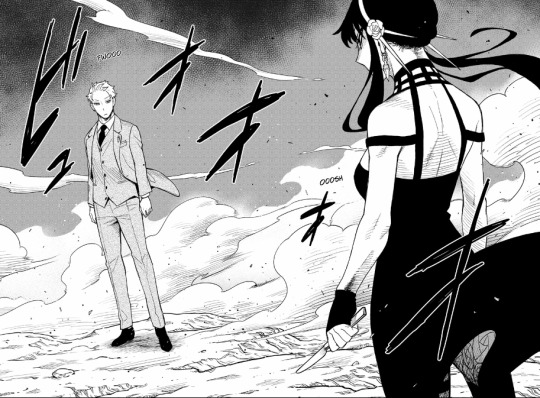

OH MY GOD ENDO!!! YOU'RE AN ABSOLUTE TEASE...!! 🤣
I did not expect Endo to do "Twilight Vs. Thorn Princess" in Mission 79 (as a joke), but here we are...!! 🤣😂🤣
Anyway, after Yor's WILD IMAGINATION about killing Loid, Camilla and the other girls tease Yor some more about her being kissed by Loid that when she got home and was greeted by him, well...:

She completely freaks out and faints, but Loid catches her...!!

I LOVE THIS PANEL SO MUCH!!! 😍💗😍💗😍
WHY ARE THEY SO CUTE!!? 😭
So because of Loid's quick thinking to catch his lovely wife, Yor freaks out again thinking he's gonna kiss her...!! But instead of kicking him out of the way like before (see Mission 35 for details), Yor instead does THIS:
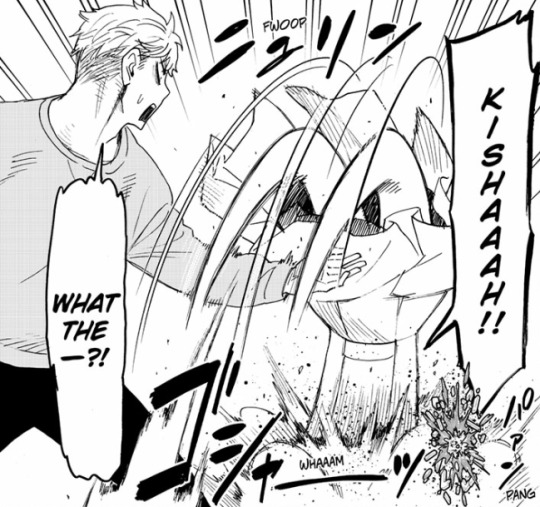
And that was Mission 79, a super fun and funny chapter with some crazy stuff thrown into the mix...!! 😁 I just adored this chapter so much, it's probably a new favorite of mine and it's got me excited for what is next to come out this madman's (Endo's) mind...!! 😆
On a side note, I wanted to release this review a lot early today, but some personal stuff came up... And even though today hasn't been best for me, I still wanted to brighten someone else's day with this silly little review of mine, like what this chapter somewhat did for me today...! 😊
Anyway, you all know the drill...!! Until the next mission, take care and be safe out there...!! Later...!! 👋😊
#spy x family#sxf#spyxfamily#spy x family manga#sxf manga#spyxfamily manga#Mission 79#yor forger#sxf camilla#sxf sharon#sxf millie#loid forger#This chapter was SO INSANE....#...AND I LOVE IT!!! 😆#ENDO YOU FUCKING TEASE!!#manga spoilers#twiyor#anya forger
124 notes
·
View notes
Text
Understanding the difference between systemic oppression and social stigma: Why endogenic systems aren't oppressed for being plural, and why that doesn't mean that their struggles are unimportant
Time for the newest syscourse topic, one that I’ve actually been thinking about quite a bit lately. I had a conversation with my very pro-endo friend about it a while back, and it caused me to realize that the entire issue is really that we don’t understand the distinction between oppression and social stigma, and why exactly endogenic plurals are stigmatized, but not oppressed. And why this doesn’t mean that struggles that they do face are “invalid” (boy, do I hate that whole concept. I hate the whole valid thing. It doesn’t do anything any justice.)
To start off with, it's important to clarify each of these terms. Oppression refers to the systematic mistreatment, subjugation, and denial of rights by those in power against a specific group. On the other hand, social stigma involves societal disapproval or mistreatment directed at individuals who possess certain characteristics or identities. While the two concepts may intersect, they are not synonymous.
Endogenic plurals, despite facing challenges in the form of social stigma, do not experience systemic oppression in the same way as historically marginalized groups. The comparison I drew in my conversation with the previously mentioned friend was to communities like furries and therians, who similarly encounter varying degrees of societal rejection. While they may be subjected to ridicule, bullying, or social ostracization, these experiences are not the same as being actively oppressed by institutions and systemic structures.
I would also like to highlight that the challenges endogenic plurals face are largely only present within the Western context. Outside of that, they not only ‘would be’ but are very easily accepted, sometimes for religious/spiritual reasons. I had someone from the Middle East (not going to specify which country because I don’t know if anyone knows who this is and would prefer to not dox them lol) describe to me that they once thought that they were endogenic – they were open to their family and community about this, and were very widely accepted for it. It was seen as creative, and a beautiful thing! But once they discovered that they had formed their system through trauma, and that they had DID, it became different. Suddenly it was something to be shunned – this is largely because it isn’t the system that’s the issue. It isn’t the concept of plurality that is an issue, by and large, it’s the trauma. It’s the fact that this is a disabling condition. It’s the fact that when you have DID, you have a rare mental illness. It’s the fact that you are experiencing trauma responses that are unpalatable to those who don’t understand them.
That’s far from the only story I’ve heard of that type, and I’ve particularly seen a LOT of Asian systems speaking about acceptance of endogenic plurality vs. rejection of DID in their cultures. This is a very West-centric argument, and also goes to show how narrow of a perspective many of the current larger syscoursers pushing endo oppression as a concept have on the subject of oppression.
You may say, “But, there’s a potential for systemic oppression and violence against endogenic plurals! We just don’t have enough data, because they’re not “out” yet.” My friend said this! I appreciated the point, because it allowed me to highlight my above argument about endogenic plurality outside of the west and also the fact that historical patterns of systemic oppression and the reasoning for such and the examination of parallels with other marginalized groups and their histories with oppression reveal that such concerns are really just… Not warranted. Genuinely, the struggles that endogenic plurals face are much closer to that of the furry community, or that of the therian community. These groups also have to deal with with societal misunderstandings and negative perceptions. Just as with endogenic plurals, the issues they face stem from a lack of understanding rather than a deliberate effort to oppress. If either of those groups were to be open about their identities, they’d face similar struggles – and they do. It’s not exactly the wisest thing to talk to your boss about being a furry or a therian, and it’s liable to get you some hate/bullying/mistreatment directed towards you at some point. It’s stigma.
While endogenic plurals may experience interpersonal mistreatment and possibly even limited job opportunities due to being open about their identities, these challenges are primarily driven by social stigma and negative perceptions. It's worth noting that any systemic violence or marginalization they encounter often stems from an intersection with already marginalized groups, such as the queer or neurodiverse communities. Sure, many endogenic plurals are queer or otherwise neurodiverse, but that intersection and further the violence directed towards it can’t exist without the existence of those other identities. A cishet, white, NT and otherwise non-marginalized endogenic plural isn’t oppressed. A trans, ND, POC who is an endogenic plural is, but not because of their plurality, though it does create a different (and notable) intersection with a few of these aspects.
It's really important to recognize that conflating social stigma with systemic oppression oversimplifies the experiences of truly systemically oppressed groups, while at the same time not even doing any justice to the issues endogenic plurals themselves DO face. If we can just… Understand that these are two very separate issues, the distinct challenges that endogenic plurals DO face can be more accurately and effectively addressed and advocated for. If we can just ACKNOWLEDGE this, that’s already contributing to a broader, more informed discourse that fosters so much more inclusivity and empathy than what we’ve got right now.
65 notes
·
View notes
Note
Hi there. I wanted to open up a conversation around DID vs plurality, and why people with diagnosed DID may feel frustrated by the plural community. Experiencing DID is distressing. Dissociating is distressing. Feeling like at times you don't have control over your reactions is distressing. Often people with DID are very high-functioning. They may have demanding, well-paying jobs. They can seem very put together by the people around them. Living with these extremes is distressing. Their experience of alters or parts is not really quite the same as how the endo community talks about alters and parts. While there can be internal components, there are also external components. Age regression can be very embarrassing, especially if accustomed to appearing like a functional, well-adapted adult to most of the world.
Now I'm not discounting your experience of plurality. I'm just trying to explain that they are two different experiences. It can be frustrating to see people put themselves in the same bucket, when it really isn’t the same. Does that make sense?
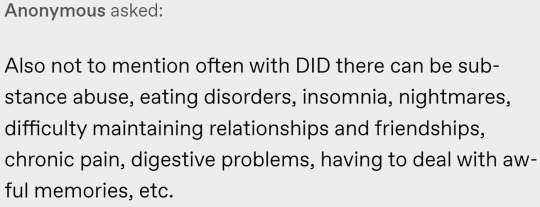
Are these two different experiences though?
To an extent, I feel this is valid. A disorder, by its nature, requires some level of distress or impairment.
But I feel like drawing a hard line between "DID" and "the plural community" as separate entities misses a lot. Plurality is a wide spectrum, and many of the leaders in the plural community are themselves traumagenic DID systems. You can look at the Stronghold System, who runs The Plural Association, for an example. Or you can look the Lunastus Collective who coined the term endogenic.
And you'll find many of traumagenic systems in the plural community sharing the same sort of philosophies as endogenic systems, despite the disordered symptoms you mentioned.
And then there's the fact that many other endogenic systems are themselves traumatized and have PTSD.
You look at the tulpa community of intentionally-created headmates, and many of those made their tulpas due to mental disorder like depression. And there's a good chance many of those experienced neglect or abuse, both of which are risk factors.
A lot of the things you list in the second post are things that many endogenic systems will also experience.
Of course it's true that how we experience our headmates might be different. Some will have more positive experience while some will have more negative. That's valid.
But I also believe that the similarities that connect us are greater than the differences that divide us.
And the harder you try to draw a hard line, the more likely you are to end up excluding other DID and OSDD systems.
21 notes
·
View notes
Note
If endos were real, their experiences would be entirely separate from our community's and would most likely require separate terms in many ways. As well as the fact that we are...trauma survivors. Getting told your experiences aren't real sucks for anyone, but when you add on the layer of trauma especially with how all trauma has struggles with denial but especially in CDDs, you'd think endos would acknowledge that yeah, our needs might be a bit more important.
If endos were real, their experiences would be NOTHING like ours. So their insistence on sharing a space, sharing terms, being accepted by us trauma survivors (which can often warp a lot of things and obvs make us all sensitive to many things), and we must sacrifice our boundaries to accept them. We MUST share with them. We MUST accept them. Us even putting "endos dni" regardless of our stance is equivalent to terrible things to them. And then have the audacity to call us bigots, traumascum, and sysmeds.
For...wanting a space for us and our experiences. Especially when a lot of people don't even believe in our trauma or disorders. When many professionals don't even believe in us. You'd think if endos actually cared, they would put us forth and also try to support us instead of ignoring boundaries, being angry that we want a separate space, and being upset. (All under the hypothetical that endogenics are a real concept and do exist.)
But no. Instead they insist on encroaching on our space, using the same terms, spreading misinformation, playing the victim, and guilting and manipulating to be accepted (which says a lot of they claim to be a minority since...that's not how minorities fight for acceptance. At all. It's not about guilt or using terms like "sysmed" to shame people.)
If they were real, you'd think they would be able to understand the importance of trauma survivor spaces. Our system also has NPD and ASPD and yeah, being pushed out of trauma spaces because of stuff like "narcissist abuse" and all sucks so yes, having limited trauma spaces for CDDs also sucks as endos take it over. Trauma spaces are important and yet they want to take over ours, mimic our experiences, use all the same words. They'll say they do no harm, but they do. When CDDs already have so little thanks to endos in the past and the harm that Empowered Multiplicity did to purposefully make it harder for us. For endos to claim our experiences, claim they're similar, claim to be able to use our terms, and to place their own experiences above ours is fucking insulting. Especially for the endos that say they have trauma too. Then you should KNOW how important spaces like this are. If endos were real, we should NOT have shared spaces because the experiences will NEVER be the same.
Endos, even if real, will never face the same kinds of things we do. They will NEVER know what it's like to have an experienced formed from trauma and have it be entirely fucking denied.
Would love (sarcastically) to see if they tried this shit with other disorders. I'm sure some have, but if it were as big as endos vs CDDs are, that would really fucking show everything and how fucking disgusting endos can be.
(again when I mention endos being real, purely a hypothetical "what if" thing to show how their intense desire to share space and be accepted by us traumagenics is completely fucking harmful and ableist all the same. trauma survivor spaces especially for specific disorders are so important. yet instead they want to prioritize their own so much that people have to literally say "this is not for you endos" when talking about their shit.)
Going paragraph by paragraph because we figured might be easier to do lol.
You'd think that. I know we hope that IF they did exist they'd understand that. Trauma survivors get told so often that if it wasn't "bad enough" (any trauma is enough and shouldn't happen) that more and more doubt if they're real and valid and it's horrible. Endos we've seen only make it worse by goingi "oh yeah that ain't bad enough your just one of us uwu"
They'd be absolutely nothing like ours. If they did somehow exist, they'd have no need for a persecutor or a protector or a trauma holder. They'd have no need for alters who literally HAVE to try and keep everyone safe from trauma. They seem to be convinced that if your anti endo you want them dead. That's not true. I know we just hope they can get help because if they do believe that there is other people WITHOUT any sort of trauma then they need to get help because that's a different disorder. The worst thing we've found about traumascum and sysmed is they're taking words used for transmedicalists and are using it as if systems aren't a mental disorder
They're the type to believe that if you don't want them in your space, then your horrible. That if you decide you want a place away from them then your evil. Like if you said "hey we don't hate endos, they've just caused us pain before so can endos not interact" they take that as you bringing harassment. If endos were real and cared, they'd be willing to try and help us, not make it worse
We actually once saw an endo trying to justify needing a protector because they "needed to be protected from sysmeds". Like no. If your so desperate to be a part of us, make your own terms. Don't take ours and use our space. Minorities will fight for equality yes, but not by shaming people like that or trying to manipulate everyone.
We get that. We highly suspect some of us having NPD. And the amount of anti-endo spaces we've seen that absolutely ban anyone with NPD from interacting is huge. We will reiterate this from previous posts, narcissistic abuse DOES NOT EXIST. A disorder is not abusive! People are! With endos trying to take over the few spaces that aren't like that, they're trying to take more and more away from people who need the spaces for their disorders. It's why yes, we believe racism can be for any race but white people shouldn't be in BIPOC spaces talking about how bad they have it because it will NEVER be the same. They are two compltely different things. (we know we brought in two completely different subjects but it's one of the best views we can think of rn)
If endos exist, they will never understand what it's like to have different alters be something like violent because of trauma they had. They don't know what it's actually like and never will
We have seen some try to compare it with disorders and we found a good one. Take PTSD. A literal TRAUMATIC disorder. If someone went "oh yeah I don't have trauma but I have PTSD" people would be PISSED. They'd be up in arms. Even when it originally wasn't considered just a simply traumatic disorder (used to be shell-shock). What's the difference there? Because one says trauma in the name? Dissociative disorders come from trauma, not just CDD's.
We fully get that and we wanted to say thank you for clarifying (and we're sorry if we came across rude in the last ask you sent, we struggle imensly with social cues).
#anti endo#anti endo supporter#endos fuck off#endos dni#actually system#actually plural#plural system#actually dissociative#system#endos aren't real#tw abuse mention#tw narc abuse mention#narc abuse does not exist#narc abuse isn't real#pro npd#npd safe#endos do not interact#dni endos#endos not for you#willowgenic dni#anti willogenic#willogenic dni#anti willowgenic#willogenics not for you#median dni#anti median#medians dni#medians not for you#non traumagenic dni#not endo safe
15 notes
·
View notes
Text
i hate scrolling the did tags because now half of it is just lamenting about endo systems.
if you hate them so much, stop posting about them into a tag that has nothing to do with them.
it gets really annoying. please constrict your posts to syscourse tags and anti endo tags, or keep it personal. while i do like to see anti endo's opinions (i think it is important to read about everyone's viewpoints even if i do not agree), i'd prefer to do it when i want to, and not be bombarded with them when i'm looking for funny memes, resources, and DID related posts [pt: DID related posts].
like, i also think there's just more productive things you can do also, depending on what exactly you hate about them.
is it... misinformation? post about resources and correct misinformation. post about myths vs. facts.
is it... that they act harmful? object to this harm, talk abot the effects of cyberbullying and death threats.
just. do something else with your time!! please!!
19 notes
·
View notes